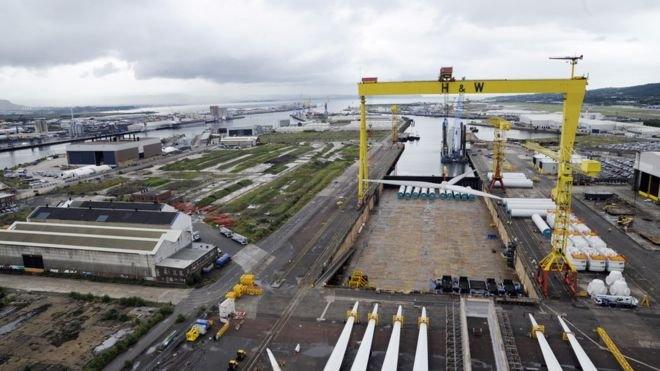Growing concerns for Harland and Wolff Belfast shipyard
- Published

The yard employs around 130 people, specialising in energy and marine engineering projects.
The Harland and Wolff shipyard in Belfast can only survive until the end of the month without a deal, Unite the Union has said.
The business has been up for sale amid serious financial problems at its Norwegian parent company.
Trade unions have been hoping that the yard could benefit from plans to build more Royal Navy ships in the UK.
But now fear there is a risk that it will not survive for long enough to participate in that.
Susan Fitzgerald, the regional coordinating officer with the Unite trade union told BBC News NI's Evening Extra programme that the government needs to step in.
The yard employs around 130 people and specialises in wind energy and marine engineering projects.
It is also part of two consortia which are bidding for work on the Navy's new Type 31e frigate.
Unions are also pointing to comments by the Defence Secretary Penny Mordaunt who has suggested that more naval vessels should be built in the UK.
Ms Fitzgerald said the incoming Prime Minister needs to follow through on that commitment to shipbuilding.
"We are calling on the Government to take the helm of Belfast shipbuilding, nationalise the yard and draw up a full strategic plan focused on maintaining capacity and skills.
"It should not be lost on the Government that Scotland - aware of the strategic and economic importance of shipbuilding - is drawing up plans to nationalise the Ferguson shipyard on the Clyde to secure its future."
"Best outcome for all stakeholders"
GMB Organiser Michael Mulholland added: ""The strategic and economic importance of a strong indigenous ship-building sector cannot be overstated. "
It's understood that Harland and Wolff had been in intense discussions with one potential buyer.
The company said it hoped to have completed a sales process at this stage but is "still in negotiation with a number of potential bidders."
It added that is trying to reach a deal that "achieves the best outcome for all stakeholders."
Senior politicians and Invest NI have held a series of meetings with Harland and Wolff management and unions in recent days.
It is one of Northern Ireland's best known businesses and its two huge cranes dominate the east Belfast skyline.
It was founded in 1861 and at its height of production during the Second World War employed around 35,000 people.
Its best known vessel is the Titanic which was built at the yard between 1909 and 1911.
It last built a ship, the Anvil Point, in 2003.